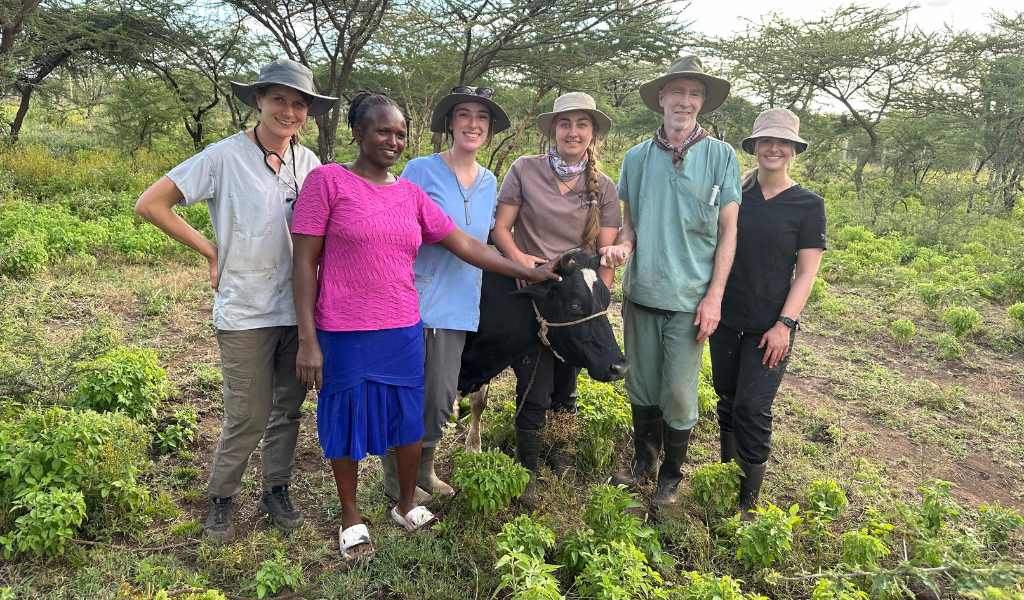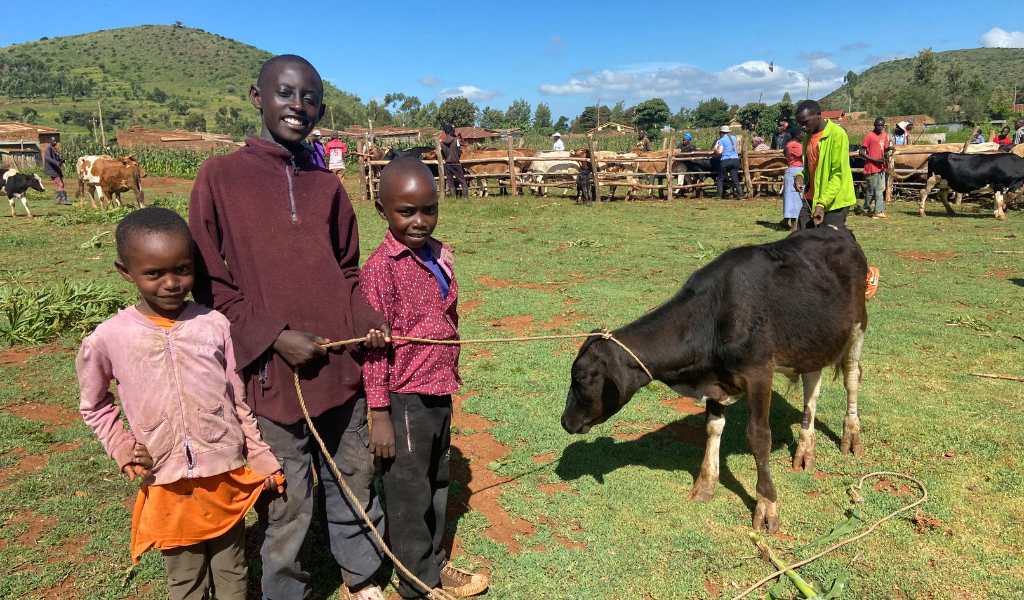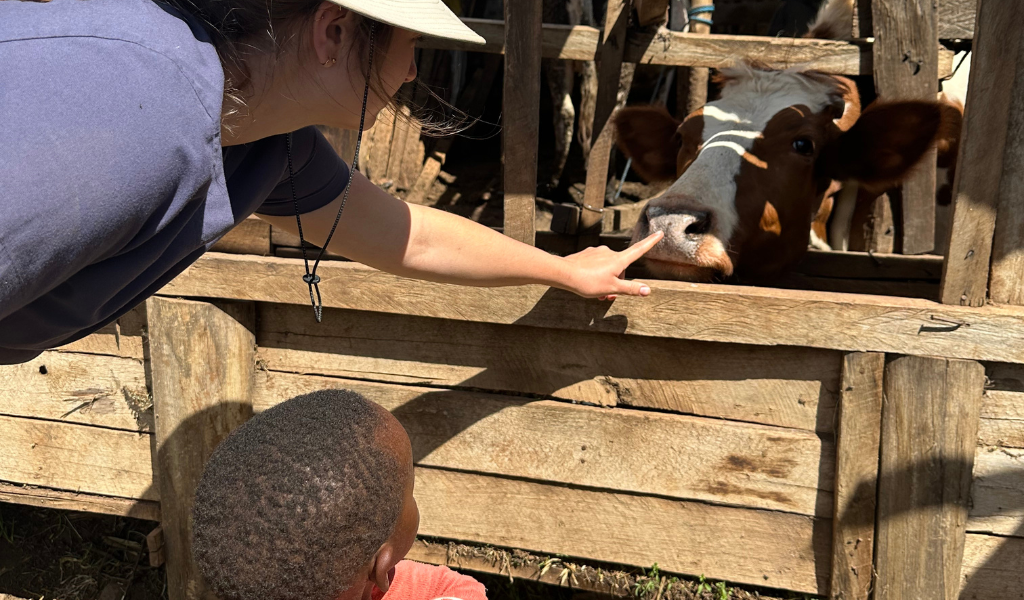AVC students return from Kenya with experiences to last a lifetime

In January 2024, the Atlantic Veterinary College’s dairy vet team again went to Kenya as part of the partnership between Farmers Helping Farmers (FHF) and the University of Prince Edward Island (UPEI). The team included me and three senior AVC students, Kaitlyn Ledgerwood, Kaitlin Coles, and Meghan Martell who were enrolled in the fourth-year “International Smallholder Livestock Health Management in Kenya” rotation. We brought many suitcases and boxes full of veterinary medicine to Meru County—donations from veterinary pharmaceutical companies such as Merck, Bimeda, Boehringer, and Vetoquinol. These products enabled the team to provide appropriate treatments for the animals encountered.
Walk-in clinics were held for cattle that were not zero-grazed in three locations: Kibirichia, Nkando, and Mbaaria (photo below). At the clinics, the dairy vet team gave dewormer to over 1200 cattle and examined over 250 animals from over 200 farms for various problems, setting new records for the number of animals seen.

The dairy vet team again had additional support from other Canadian volunteers on certain days: 1) Dr. Caroline Ritter, Canada Research Chair in Social Epidemiology for Healthy Animals and an assistant professor in veterinary epidemiology at AVC who helped with diagnoses and treatments; 2) Dr. Colleen Walton, a food scientist, and Emily Wells, a PEI chef, who helped with data collection; 3) Dr. Martha Mellish, an assistant professor in equine medicine and veterinary student Anya Floyd who focused on their donkey welfare project; and 4) Dr. Victoria Bowes, a poultry pathologist from British Columbia, who focused on poultry production. The AVC dairy students worked with Martha and Victoria for a day to see first-hand what their projects entailed and provided them with additional support as well.
The dairy vet team was also joined by Kenyan animal health professionals on certain days: a) Bimeda Ltd. employees Drs. Oscar Were and Maurice Msanya, and paravets John Njoroge and Mercy Kendi; b) veterinarians Drs. Remmy Mugambi and Douglas Matara from Tornado Vet Clinic; c) veterinary technicians Henry Mutea and Simon Muchoki; d) Meru County livestock extension officer George Kobia; and e) senior veterinary students from Nairobi University Michelle Rop, Faith Ngina, Isaac Khisa, and Kelvin Gichaga.
The Kenyans provided their expertise when examining sick animals, shared their perspectives during training sessions, enjoyed learning our “best management practices” training messages for farmers, and learned from our systematic approaches to working up cases, diagnosing and treating ailments, and/or providing health management advice. Training Kenyan animal health professionals is an important component of the project, enhancing the sustainability and ongoing project benefits.
The Bimeda representatives hired a video company to publicize how Bimeda is giving back to the Meru County community through their support of our veterinary work. Bimeda Kenya has supplied FHF and AVC with medications over the years to help us treat many cows.

On the days without walk-in clinics, the dairy vet team traveled to farms to check animals and provide health management information. It was estimated that over 235 farmers received health management information and/or services from these efforts, with another 35 animals examined for various problems. The major health problems observed included infectious diseases such as East Coast fever, parasite infestations, udder infections, and inadequate nutrition, with these problems leading to low milk production, poor reproduction, and inadequate growth. Interesting cases of lumpy jaw, woody tongue, polyarthritis from a navel infection, babesiosis, anaplasmosis, and bovine habronema were also seen. We even detorsed a uterus while in Kenya this time.

As part of a soon-to-start Kenyan project focused on One Health, the dairy vet team piloted some training on how to recognize, treat, and prevent zoonotic diseases that can affect people and their animals. We also visited the Karatina Veterinary Laboratory and a new local university in Meru County to explore options for collaborating on outreach, training, and research activities related to zoonoses, and to determine their capacity to test for zoonotic diseases. These institutions could be valuable partners within the upcoming One Health project.
We are very thankful for the support of three Kenyan FHF staff, Leah Kariuki, Stephen Chandi, and Brian Mutuma, who helped with translation and animal handling during seven seminars, three walk-in clinics, and dozens of farm visits, and benefitted from additional continuing education in the process.
Overall, the January 2024 dairy vet team had another very successful trip, with many animals receiving treatment or prevention interventions, many farmers being educated and/or assisted, and many animal health professionals receiving training and practical experience. It was very gratifying to see the positive changes on the farms, including some improved cow comfort, nutrition, mastitis control, reproduction, and calf management. The students were excited to provide information to farmers that was acquired through research projects funded by the Queen Elizabeth II Diamond Jubilee Scholarships of Canada.
We look forward to returning to Kenya in the future to continue to partner with these dairy groups (and women’s groups and schools) in their goals toward improved productivity and self-sufficiency in an environmentally and socially responsible manner. Thank you again to all our supporters for their assistance in making this all possible. Special thanks to FHF, long-standing partners with AVC/UPEI on these activities, for all the logistical support, especially Ken and Teresa Mellish. Also, we appreciate the assistance of Global Affairs Canada, which provided some of the funding, and many veterinarians who donated funds to help cover expenses.